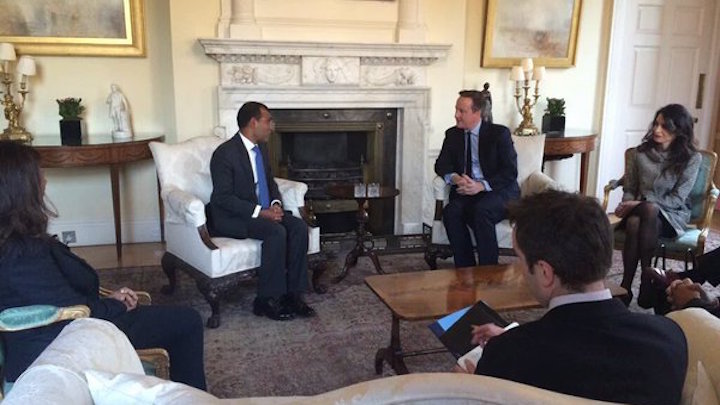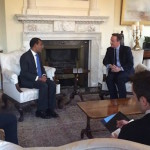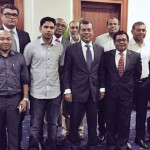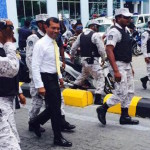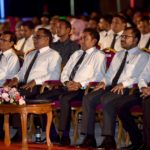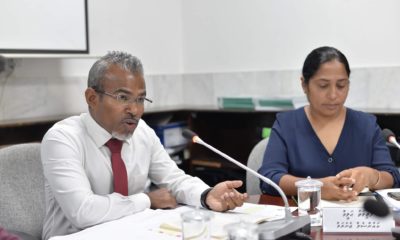Former President Mohamed Nasheed met with UK Prime Minister David Cameron in London today to discuss the political situation in the Maldives.
A Downing Street spokesperson said after the meeting that Nasheed “thanked the Prime Minister for the role the UK had played by continuing to raise his case, including with other countries at the recent Commonwealth Heads of Government meeting last November.”
Nasheed’s temporary release to undergo surgery in England was secured by a diplomatic lobbying effort led by India, Sri Lanka, UK, and the US.
Nasheed and Cameron also agreed that while his medical release was a positive development, “more needed to be done and it was important for the Maldivian government to maintain momentum, which was necessary if real change is to be delivered,” the spokesperson said.
The pair agreed that an upcoming visit to the Maldives by the Commonwealth Ministerial Action Group is “an opportunity for all Commonwealth members to send a consistently strong message on the need for the Maldivian government to engage in open political dialogue and free all remaining political prisoners swiftly.”
Cameron also assured Nasheed that “the UK would continue to raise concerns about the erosion of democracy and wider situation in the Maldives and it would also continue to discuss the situation with international partners, including how best the international community can make its concerns clear to the Maldivian government.”
Following November’s Commonwealth Heads of Government meeting, Cameron told the UK parliament that CMAG had decided “to put the Maldives under formal consideration and to visit there in early 2016.”
But the Maldivian foreign ministry promptly denied that the intergovernmental organisation’s human rights arm had made such a decision.
Cameron had urged Commonwealth nations to take action against the Maldives over “unacceptable” events, including the jailing of political prisoners.
In June, Cameron became the first head of government to call for Nasheed’s release following his conviction on a terrorism charge in March. Nasheed was sentenced to 13 years in prison after a 19-day trial that drew widespread international condemnation over apparent lack of due process.
Very happy to have sat down with PM @David_Cameron. Certain that better days ahead for the people of the Maldives. pic.twitter.com/0aWo0xqCDF
According to the former president’s office, Nasheed briefed Cameron on the Maldives’ transition to democracy and the current political landscape.
The pair discussed “establishing an environment conducive to an inclusive, free and fair election” as well as strengthening independent institutions.
The opposition leader is presently ineligible to contest in the 2018 presidential election.
Prior to his departure to the UK last week, Nasheed had also met with top diplomats from UK, Canada, Norway, Australia, Italy, Switzerland, Germany and the European Union in Colombo.
Sources said Nasheed hoped that President Abdulla Yameen would “use the opportunity offered by his release” to initiate talks with the opposition.
Yameen’s administration had remained defiant in the face of mounting diplomatic pressure and mass anti-government demonstrations last year, slamming alleged meddling in internal affairs by Western powers and insisting that Nasheed must exhaust the domestic appeal process.
An appeal of Nasheed’s terrorism conviction is now before the Supreme Court.
In October, a UN human rights panel ruled that Nasheed’s imprisonment was illegal and politically motivated. The government initially rejected the non-binding opinion as “flawed and premature,” but now says the Supreme Court will consider the judgment by the Working Group on Arbitrary Detention.
Nasheed is meanwhile due to meet the UK press on Monday along with his heavyweight international lawyers Gared Jenser, Amal Clooney, and Ben Emmerson.
Genser and Clooney have been lobbying the governments of the US and UK to impose targeted sanctions against top Maldivian officials to secure Nasheed’s release. A confidential list of targets have been shared with both governments.
The European parliament has also adopted a non-binding resolution calling on member states to impose sanctions against Maldivian government officials and their supporters in the business community.
After previously denying permission for Nasheed to travel overseas and insisting that the surgery is available in the Maldives, the government’s sudden change of heart was prompted by “intense diplomatic pressure and under the looming threat of international sanctions,” Nasheed’s lawyers said.
But Foreign Minister Dunya Maumoon insisted last week that the government did not cave in to foreign pressure brought to bear during official visits by the Indian foreign secretary and Sri Lankan foreign minister.
According to the former president’s office, Nasheed and Cameron also exchanged views on easing the process of obtaining visas for Maldivian students.
In his first tweet after the temporary release from prison, Nasheed wrote: “Freedom, even if fleeting, gives me renewed hope. My gratitude to those who believed leads to a new determination to secure justice for all.”

